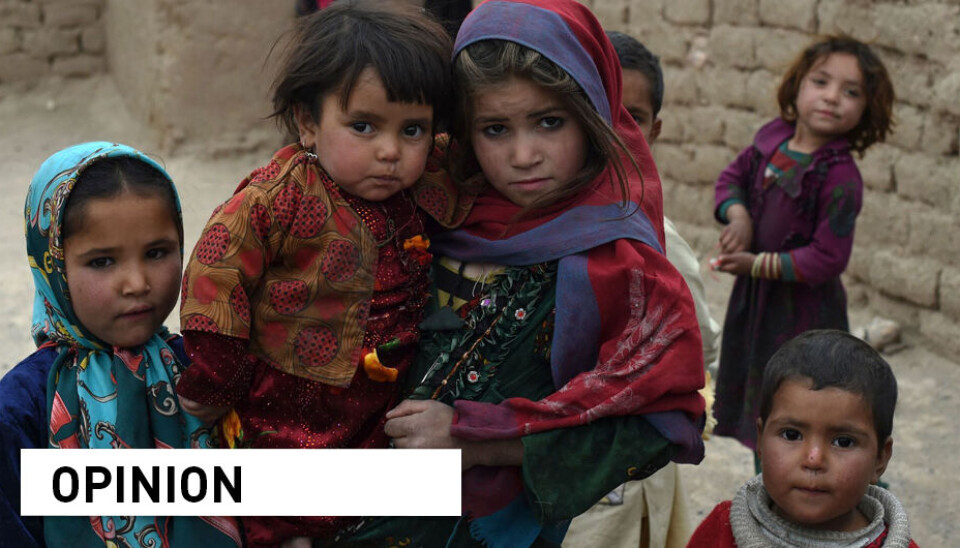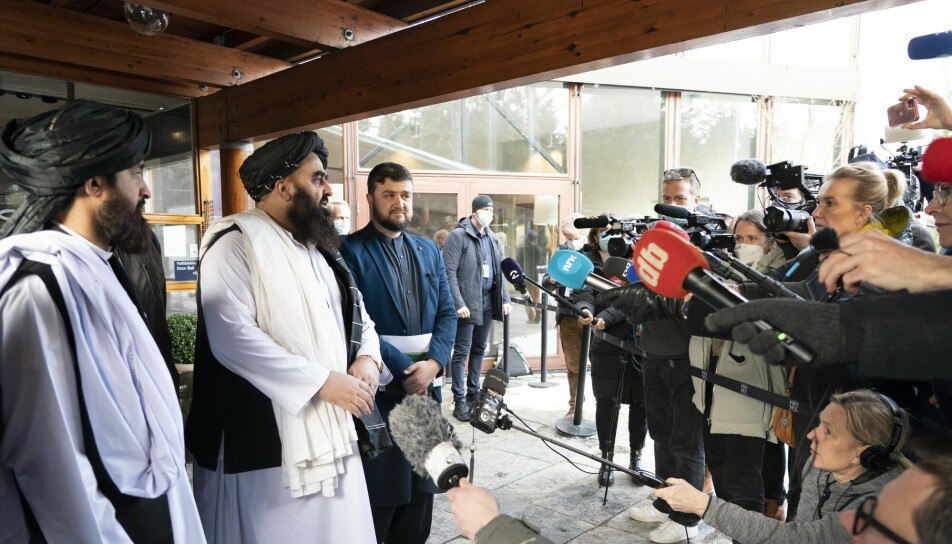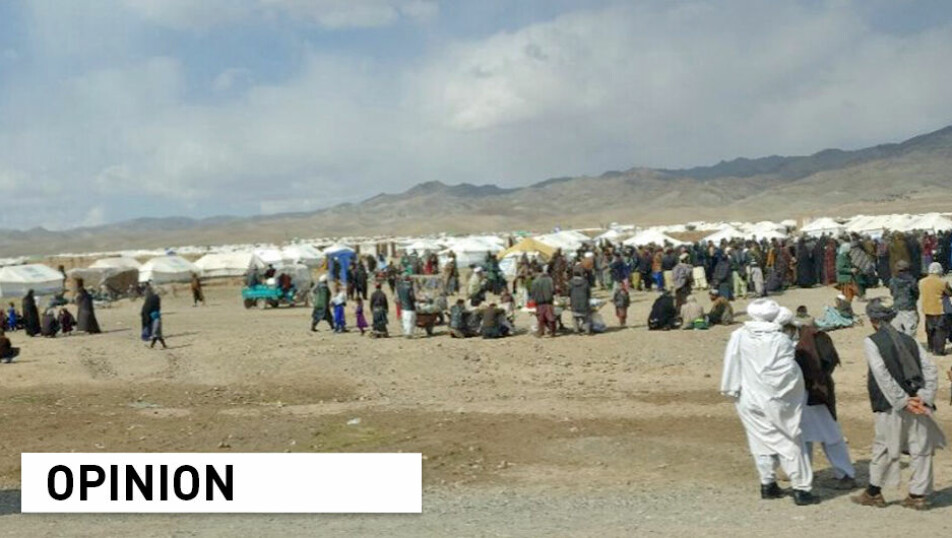Opinion:

Afghans are starving. The USA and others must cooperate with the Taliban
OPINION: The UN warns of a risk that a million Afghan children will die. In this situation, there is no way of avoiding cooperation with those in control of the country, namely the Taliban.
The population of Afghanistan is facing a humanitarian catastrophe. Twenty-three million Afghans, more than half of the population, are starving. The UN warns of a risk that a million Afghan children will die.
In this situation, there is no way of avoiding cooperation with those in control of the country, namely the Taliban, in order to address the need.
The United States and its allies, who were responsible in 2001 for a military intervention that was intended to prevent international terrorism, but which turned into 20 years of warfare in Afghanistan, have an obvious responsibility.
The United States and other countries are resisting cooperation, however, on the basis of the Taliban’s history of tolerating terrorism and their human rights violations.
These countries want to avoid anything that could be interpreted as granting recognition of the Taliban regime. This was an important consideration during the talks with the Taliban at Holmenkollen, Oslo in late January. Holding a dialogue with Western countries was important to the Taliban, even though their ministers were denied the opportunity to meet the Norwegian foreign minister, Anniken Huitfeldt, or other people of similar rank.
Who is representative of a country?
The unwillingness to recognize Taliban was also apparent in President Biden’s decision to seize USD 7 billion of assets belonging to the Afghan Central Bank, putting half in a humanitarian fund for the Afghan population and setting aside the other half to be able to compensate victims of the terrorist attacks on 11 September 2001. And the dilemma is clear: money is sought kept beyond the reach of the Taliban, but should at the same be channelled to keep Afghanistan’s hospitals and schools operational.
It is correct, as is maintained by the Norwegian government among others, that international law imposes no obligation to recognize the governments of other countries. But governments cannot avoid the question of who should be considered able to represent a country in the context of international law. This applies to everything from who should represent Afghanistan at the United Nations to who should be held responsible for ensuring that the state complies with its international obligations in respect of human rights, the environment and combatting terrorism.
Traditionally, international law has in matters of recognition attached weight to who has effective control over a territory. But in recent years, the view has been advanced that the key questions concern the extent to which the regime has come to power in accordance with the national constitution and whether it respects international human rights and other obligations under international law.
In the context of Afghanistan, the Taliban has no credible competitors when it comes to exercising control over the country. The Taliban has declared that the 2004 constitution has been abolished and that they are working on a new constitution.
While the human rights situation is challenging, protection of the civilian population demands cooperation – that is, cooperation with the Taliban.
The previous regime has no realistic chance of returning to power. While the human rights situation is challenging, protection of the civilian population demands cooperation – that is, cooperation with the Taliban.

Freezing of assets contributes to collapse
The United States’ freezing of the Afghan Central Bank’s assets is contributing to the collapse of Afghanistan’s financial system. Afghans’ savings are rapidly declining in value, it is impossible to withdraw money, and it will be difficult for aid organizations and others to buy goods or pay wages. Accordingly, the United States’ freezing of the Central Bank’s assets is contributing to the humanitarian emergency.
Seizure of these assets would contravene international rules on state immunity. The rules on arrest of assets through foreign courts are codified in the UN Convention on Jurisdictional Immunities of States and their Property, which was adopted by the UN General Assembly in 2004. Although Norway has ratified this convention, it has not yet been ratified by a sufficient number of states for it to come into force.
The main provisions in the convention are seen, however, as expressing general principles of international law that are binding on all states. It is true that we see various trends in states’ practices, with some states wishing to extend state immunity, while other states are more restrictive. The United States has made an exception for states they define as terrorist states, for example, although this does not apply to Afghanistan.
The United States has a unique role in the global financial system, and many states have placed their currency reserves in the American Federal Reserve. This gives the United States an opportunity to exert pressure on these states.
Norway and other countries should protest against a country retaining assets that belong to the Afghan people, in contravention of the UN convention and generally accepted principles of international law. In addition, and unsurprisingly, this seizure has provoked the Taliban, making more difficult the cooperation for which the Oslo talks attempted to secure a basis.
Not all forms of cooperation are recognition
Under international law, not all forms of cooperation with the Taliban can be interpreted as recognition of the regime. Norway has a long tradition of consultations with various conflicting groups, without these consultations having to be seen as constituting recognition. The talks at Holmenkollen should be seen in this context.
It is not possible to channel aid through the UN and voluntary organizations without an understanding with the Taliban.
But cooperation with the Taliban must go further. It is not possible to channel aid through the UN and voluntary organizations without an understanding with the Taliban. This applies to humanitarian aid, and also to education and health.
For example, the Taliban must provide access to lists of employees if support is to be given to teachers to ensure that girls and women can access all levels of education. Similar requirements will apply in healthcare and other sectors.
Afghanistan, and the state institutions that have been built up for the past 20 years, are completely dependent on external support. In any event, the demands being placed by the outside world on the Taliban will be weakened if there is no will to continue this support.
When the Taliban previously held power, from 1996 to 2001, they became ever more isolated. This isolation contributed to humanitarian suffering, economic suffering, extensive violations of human rights, and a role hosting international terrorist groups. This role culminated in the terrorist attacks on the United States in 2001. Hosting Al-Qaeda, and failing to restrain it, the Taliban bears considerable responsibility for these attacks. But a policy of isolation that prevents all dialogue with the Taliban and has a serious impact on ordinary Afghans is difficult to defend.
It is necessary to prioritize the provision of adequate amounts of aid, even if this involves cooperating with the Taliban. Then formal recognition of the regime can perhaps serve as a carrot to encourage the Taliban to play their part in getting aid through to the population and respecting human rights.
———
This is an extended version of an op.ed published in the Norwegian newspaper Aftenposten on March 20. The English version was first published on the Prio Blog.
Share your science or have an opinion in the Researchers' zone
The ScienceNorway Researchers' zone consists of opinions, blogs and popular science pieces written by researchers and scientists from or based in Norway. Want to contribute? Send us an email!






























